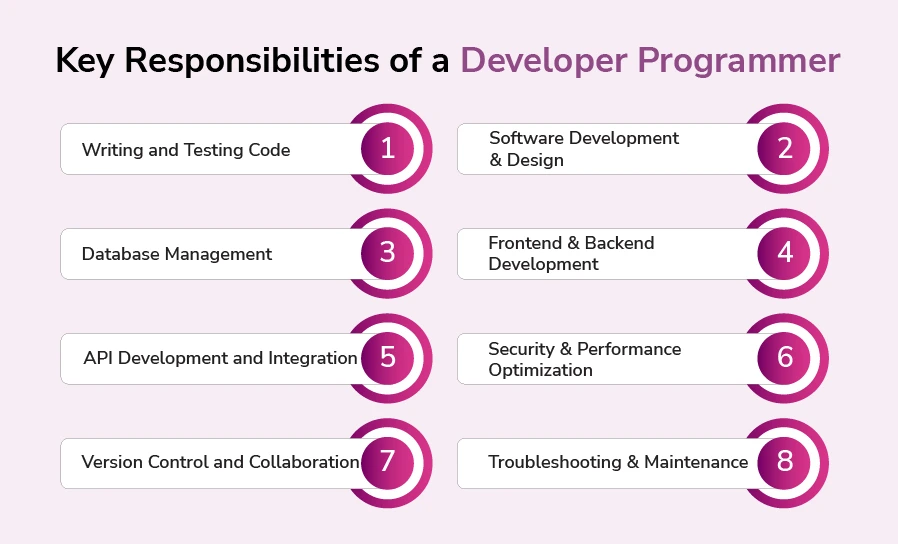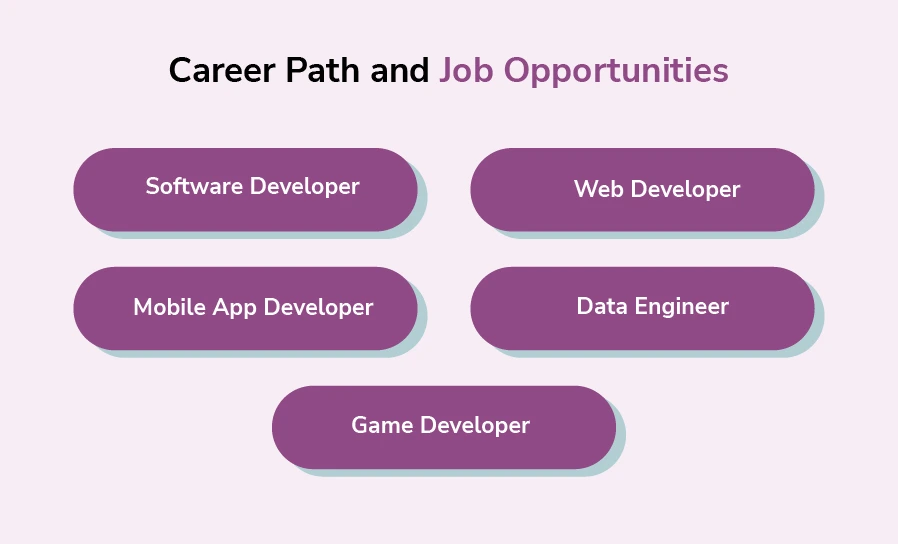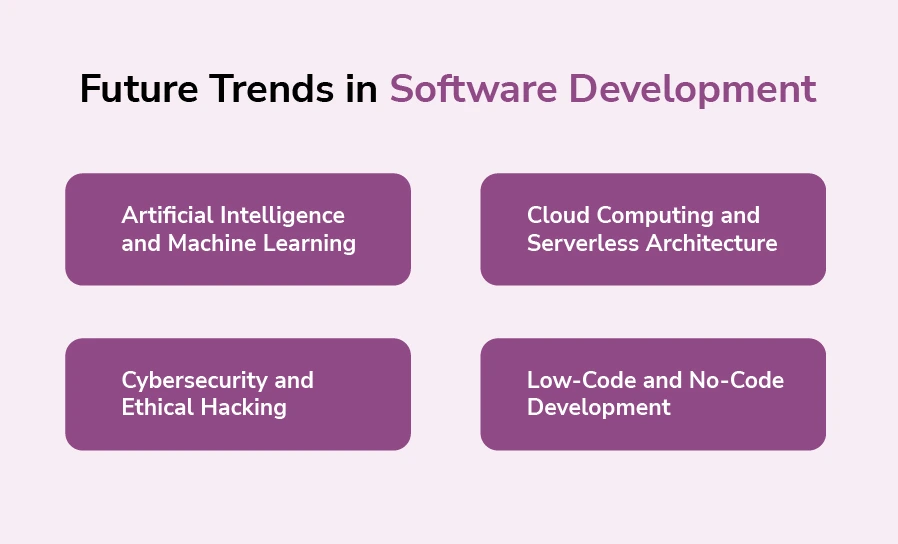Complete Guide on the Developer Programmer

Complete Guide on the Developer Programmer
Technology keeps evolving, which brings developer programmers to the front as essential personnel who design software applications while developing them and performing maintenance tasks.
These professionals operate in multiple business sectors to produce solutions that boost productivity, all while applying their programming knowledge. This complete guide gives the necessary information to those who are new to programming development and also assists experienced developers who want improved skills.
🔑 Key Highlights
-
- Software system development involves all stages from design through coding to testing and ultimate maintenance tasks for Developer Programmers.
- Different programming languages and web development systems along with cloud technologies become essential skills for developers to master.
- Career progression leads to three positions namely Software Developer and Web Developer alongside Data Engineer.
- The essential requirement for developers is maintaining current knowledge of AI and Cloud and Cybersecurity developments.
Who is a developer programmer?
Developer programmers write and test programming code, after which they maintain it to develop software applications systems and programmes. Technologies and frameworks feature among the tools that developer programmers utilise while developing software systems that fulfil business objectives and customer requirements.
Key Responsibilities of a Developer Programmer

The tasks performed by developer programmers depend on the field where they work and the dimensions of their organisation, alongside the particular work they handle. However, common responsibilities include:
1. Writing and Testing Code
The programming duties involve creating software solutions through Python, Java, C++, JavaScript and PHP development languages.
A developer programmer must guarantee code quality combined with programme efficiency and protect system security.
A developer tests application units while debugging them so they can locate and correct code mistakes.
2. Software Development and Design
The programmer interprets user needs to create suitable software designs.
Work together with project designers and project managers along with stakeholders.
Application developers must optimise programmes to achieve better speed and increased expansion capabilities.
3. Database Management
Design, develop, and maintain databases.
Modern data storage and retrieval requires the implementation of SQL, NoSQL and different database technologies.
Ensure data security and integrity.
4. Frontend and Backend Development
The developer works to create programs across frontend (client-side) and backend (server-side) application components.
Engineering teams should construct friendly interfaces by adopting the HTML CSS and JavaScript frameworks React and Angular.
Develop secure backend systems through Node.js in combination with Django along with Spring Boot or alternative programming frameworks.
5. API Development and Integration
The team must deploy RESTful and GraphQL APIs together into the system.
The system needs to establish frictionless information exchange among different software programme elements.
Our system should link up with external third-party services that provide payment management and cloud platform solutions.
6. Security and Performance Optimization
The system identification process will follow up with security measure implementation.
The software needs optimised codes and database queries to execute better.
Upgrading software versions must be performed regularly to solve both security threats and system bugs.
7. Version Control and Collaboration
The implementation of version control requires a tool between Git, GitHub, GitLab and Bitbucket.
The team deploys Agile together with DevOps methodologies to support collaboration.
Maintain documentation and code repositories.
8. Troubleshooting and Maintenance
Technical support for software applications is provided to customers.
Troubleshoot performance issues and resolve software bugs.
Your organisation must conduct consistent update operations and distribute security upgrades to current applications.
Essential Skills for a Developer Programmer
Development programmers need to master technical knowledge together with soft capabilities to succeed in their field.
1. Technical Skills
A developer programmer needs proficiency in programming languages, which include Python, Java, JavaScript, C++, C# Ruby Swift and many more.
Web Development: Knowledge of HTML, CSS, JavaScript, and frameworks like React, Vue, or Angular.
A programmer must demonstrate experience using Node.js together with Django, Flask, Spring Boot and Laravel, among others, for backend development.
Database Management: Understanding SQL (MySQL, PostgreSQL) and NoSQL (MongoDB, Firebase).
The practitioner demonstrates working knowledge of cloud systems that include AWS, Azure and Google Cloud.
My experience includes handling DevOps tools that incorporate CI/CD pipelines alongside Docker management and Kubernetes administration, as well as Jenkins operations.
Version Control: Mastery of Git and platforms like GitHub, Bitbucket, and GitLab.
Security Awareness: Knowledge of cybersecurity principles and best practices.
2. Soft Skills
The expert should possess skills enabling them to examine problems and then devise practical solutions.
Communication: Clear articulation of technical concepts to non-technical stakeholders.
Teamwork: Working collaboratively in development teams.
Time management serves to meet all important project deadlines.
The capability to learn new technologies, together with the capacity to conform to industry trends, represents adaptability.
Career Path and Job Opportunities

The global demand for developer programmers continues to rise, which offers diverse industrial career prospects to professionals. Businesses currently seek developer programmers actively because they need digital solutions combined with strong online presence development. Various employment positions exist in this field with their tasks and necessary qualifications.
1. Software Developer
Conducting software application development tasks is the essential duty of developers who build solutions for commercial and end-user requirements. The developers work together with all stakeholders to receive project specifications before transforming those needs into workable programming code.
Within their work, developers utilise programming languages such as Python, Java, C++, or C# to build software, which they make usable, reliable and efficient through development. The creation of software involves developing both desktop applications and enterprise systems and embedded systems.
2. Web Developer
The main task of web developers involves designing and sustaining websites and web applications. Software developers work on either user interface and experience frontend development tasks or server-side logic and database backend development, or they may specialise in full-stack development that integrates both frontend and backend development tasks.
Front-end developers employ HTML, CSS, and JavaScript alongside React or Angular for their technological applications. Back-end developers operate with programming languages Node.js and Python and PHP as well as connecting to databases MySQL and MongoDB. A full-stack developer utilises front-end and back-end abilities to establish dynamic web applications that interact with users.
3. Mobile App Developer
Software engineers build programs that operate exclusively on mobile technology, which includes smartphones and tablets. The developers create software applications that function across Android devices and iOS systems, employing Flutter and React Native platforms together with Kotlin programming and Swift programming.
Developers need to understand the particular difficulties associated with mobile programming by addressing issues regarding system performance enhancement while designing responsive layouts that maintain device compatibility.
4. Data Engineer
The work of data engineers involves constructing and upholding methods through which data pipelines input huge volumes of information while preserving operational efficiency. These professionals utilise big data platforms like Hadoop along with Apache Spark and ETL (Extract, Transform, Load) tools to acquire and cleanse multiple data sources for proper organisation.
The work of data engineers produces high-quality, available data for both data scientists and analysts who need access to valuable insights. The primary tools they utilise for their tasks are Python alongside Java and Scala programming languages when combined with SQL and NoSQL database systems.
6. Game Developer
Game developers establish and construct digital video games that run on different platforms, including game consoles and personal computers, as well as mobile devices. The developers implement their game creations with established tools, which include Unity, Unreal Engine and Godot game engines.
To integrate visuals, audio and gameplay mechanics, game developers collaborate with sound engineers and designers in addition to artists. The critical aspect of their skills involves programming in C++ or C#, which allows them to optimise game performance while designing innovative user interfaces.
Future Trends in Software Development

Software development as a field continues to transform because new technology systems and workplace strategies drive industry evolution. Businesses, together with consumers, depend more and more on digital solutions, whereas software developers need to follow emerging trends to maintain their market position. A series of dominant trends will steer the direction of software development.
1. Artificial Intelligence and Machine Learning
The application of artificial intelligence (AI) together with machine learning (ML) has become fundamental for software development processes. Several businesses expect to use AI-generated applications, including chatbots, together with recommendation systems and predictive analytics on a broad scale across various sectors.
The improvement of machine learning models will result in increased focus on accessibility and scalability for these technologies, which will enable businesses to implement them at maximum efficiency.
2. Cloud Computing and Serverless Architecture
Businesses are undergoing fundamental changes in their management of IT infrastructure because of cloud computing and this trend will persist into the future. Comprehensive cloud solutions enable businesses to implement application expansion and boost operational speed while decreasing infrastructure expenses independently of physical hardware maintenance responsibilities.
3. Cybersecurity and Ethical Hacking
The expanding digital solution creates rising security vulnerabilities. Strong security measures within software development will grow essential because advanced cyberattacks continue to evolve. Security has to be built into development procedures by developers through the complete cycle by using secure coding methods and encryption and vulnerability testing technologies. Ethical hackers remain crucial because they find security gaps that ethical hackers resolve before attackers seize them as vulnerabilities.
4. Low-Code and No-Code Development
The market embraces low-code and no-code development platforms to fulfil business requirements regarding quicker application generation and implementation. Such platforms enable software development by users who don’t understand coding through graphical interface systems using simple interactive component placement.
Conclusion
For developers, programming success requires obtaining both technical expertise and soft communication abilities. A developer must excel in programming languages as well as web development skills, database management and cloud computing expertise, along with cybersecurity fundamentals.
A developer gains effectiveness in real-world projects through their ability to solve problems while communicating with others and collaborating as part of their skills and adapting to situations. A developer programmer who enhances their technical knowledge along with soft competencies maintains their industry leadership in the continuously progressing tech field and achieve career success.
FAQs
1. What is a developer programmer?
A developer programmer is a person who writes, tests, and maintains software applications or systems.
2. What are the 4 types of programmers?
The 4 types of programmers are as follows:
- Frontend Developer
- Backend Developer
- Full-Stack Developer
- Mobile Developer
3. What is the role of a developer programmer?
The role of a developer programmer is to design, write, test, and maintain software applications or systems. They are responsible for translating requirements into code that enables software to function as intended.
4. Who is called a programmer?
A programmer is someone who writes, tests, and maintains computer software by creating code in various programming languages.